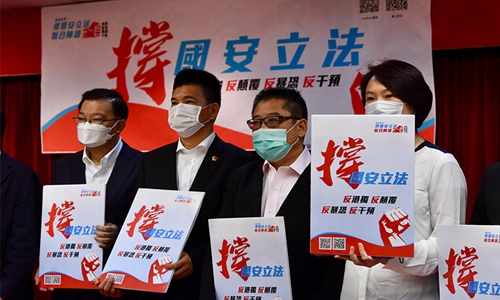Chief executive appointing judges for national security cases based on Basic Law: HK senior counsel
By Fan Lingzhi Source:Global Times Published: 2020/6/21 22:35:47

The United Front Supporting National Security Legislation holds a press conference on June 8, saying that 2.92 million Hong Kong citizens have signed a petition in support of the proposed national security legislation. Photo: cnsphoto
A senior Hong Kong lawyer on Sunday told the Global Times that the newly unveiled draft of the national security law for Hong Kong makes him "reassured" and that it was "strange" that the Hong Kong Bar Association said judges appointed by the chief executive to deal with crimes against national security were "ruled by man" because the appointments are based on the Basic Law.
Ronny Tong Ka-wah, a senior barrister in the Hong Kong Special Administration Region (HKSAR) and former chairman of the Hong Kong Bar Association, told the Global Times that he would have concerns if the national security law could damage Hong Kong's judicial independence, but after seeing the main content of the draft law he felt at ease "especially the relevant provisions for the international covenant on civil, and political rights and international covenant on economic, social and cultural rights which were mentioned in the draft."
The draft law, which was reviewed at the meeting of the 19th Session of the 13th National People's Congress (NPC) Standing Committee which concluded on Saturday, stipulates that the commissioner's office for national security affairs in Hong Kong and relevant national authorities exercise jurisdiction over a very small number of crimes against national security under special circumstances.
When asked how he understood "a very small number," Tong said he had not received much information so it was difficult to answer, noting that he would like to see clearer and detailed content over the clause.
However, Tong gave examples that could be included in such "very few cases" based on the common understanding of the law. For example, if there is very serious unrest in Hong Kong and the HKSAR government cannot handle it, the chief executive may ask the national office to deal with it. Also, if the suspect is a very important official, it may not be appropriate for a Hong Kong court to handle the case.
In addition, the draft said the chief executive of the HKSAR government shall appoint a number of judges from current or qualified former magistrates, district court judges, judges of the Court of First Instance of the High Court, judges of the Court of Appeal, and judges of the Court of Final Appeal. The judges are responsible for handling crimes that endanger national security.
Tong dismissed an accusation by Anita Yip Hau-ki, vice chairman of the Bar Association, who said these appointments would mean "the rule of man." Tong said Yip's claim is "strange," as the Basic Law stipulates that judges in the HKSAR are appointed by the chief executive on the recommendation of an independent commission composed of local judges and eminent persons from the legal profession and other sectors.
"Hong Kong's general law and some administrative regulations also allow the chief executive to appoint judges to handle special cases, such as major public investigations," said Tong, noting that "whoever is appointed by the chief executive will hear cases independently, it's not the chief executive hearing the cases, so I don't see anything undermining the independence of the judiciary in Hong Kong."
"I don't want to be too critical of them [some people of the association] because I was once the chairman of the association. I just hope professional organizations could speak out from a professional attitude," Tong said.
Senior legal figures should understand Hong Kong's legal system, Tong said, while noting that "given they understand, I wonder why they still made such comments. That made me feels very strange."
According to Hong Kong media on Sunday, the 20th Session of the 13th NPC Standing Committee will be held from June 28 to 30 in Beijing, and the national security legislation is likely to be enacted before July.
Tong said many residents in Hong Kong hope the law can come into effect as soon as possible, and he hopes related authorities can listen to different advice as to how best to make the relevant legislative process.
Tong noted the legislation is urgent as Hong Kong now has no law to deal with cases involving national security, which is not good.